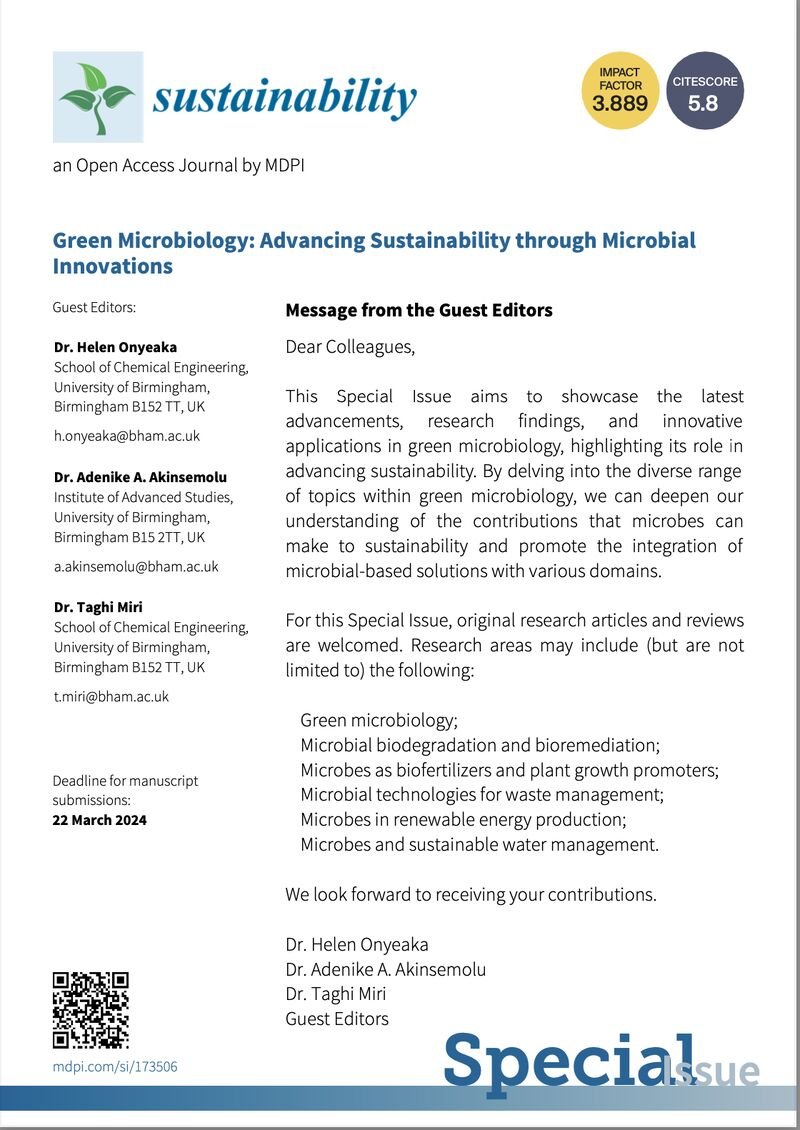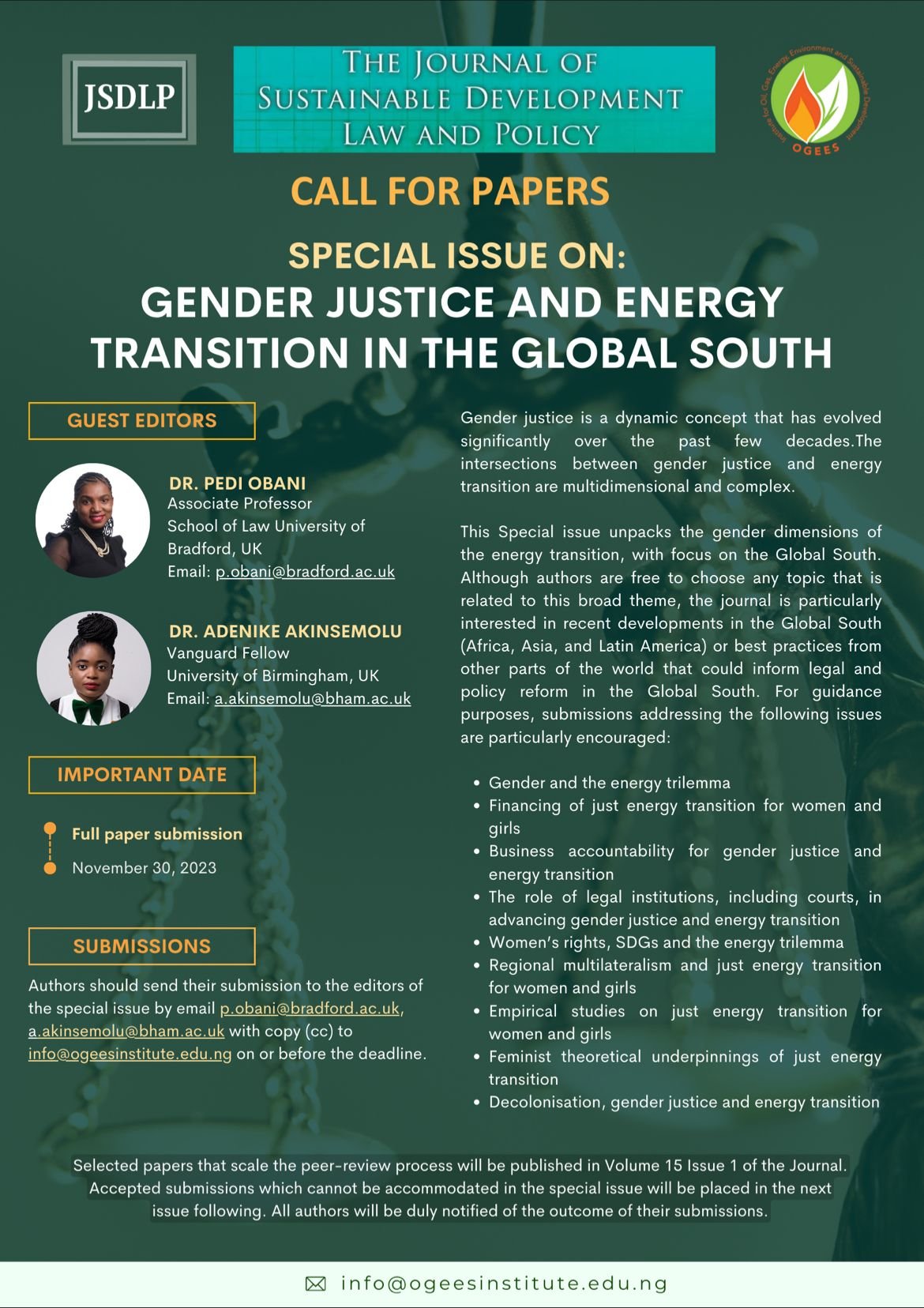Editor(S)
Dr. Pedi Obani, Associate Professor, School of Law University of Bradford, UK
Dr. Adenike Akinsemolu, Vanguard Fellow, University of Birmingham, UK
Overview
The Journal of Sustainable Development Law and Policy invites scholarly articles for publication in a special issue on the subject “Gender Justice and Energy Transition in the Global South”. The Journal is a peer-reviewed interdisciplinary journal that fosters the dissemination of scholarly research work by teaching and research scholars in Africa and across the world in the area of sustainable development law and policy. This special issue will be published in Spring 2024.
Gender justice is a dynamic concept that has evolved significantly over the past few decades. The idea of gender equality lies at the heart of achieving inclusive and sustainable development. The Sustainable Development Goal (SDG) 5 is dedicated to achieving gender equality. There is limited data on the level of progress with the goal. But all the available evidence suggests that the world is off track and unlikely to achieve gender parity by the next century. One area where lack of gender equality is evident is in the access to and allocation of energy resources. Lack of access to energy adversely affects women’s livelihoods and wellbeing, particularly in the global South. There is also the risk of perpetuating the existing patterns of gender inequality if the energy transition process does not mainstream feminist perspectives and gender justice as a priority.
The intersections between gender justice and energy transition are multidimensional and complex. It is widely accepted that gender and related roles significantly affects the impacts of climate change on people. Similarly, gender affects access to energy and other resources. However, most energy transition policies adopt a primarily technocratic approach which does not account for the significant nuances resulting from gender and other social constructs. This creates a misfit between the energy transition policies and the real challenges women and girls face in addressing the energy trilemma (reliability, affordability, and sustainability).
For guidance purposes, submissions addressing the following issues are particularly encouraged:
Gender and the energy trilemma
Financing of just energy transition for women and girls
Business accountability for gender justice and energy transition
The role of legal institutions, including courts, in advancing gender justice and energy transition
Women’s rights, SDGs and the energy trilemma
Regional multilateralism and just energy transition for women and girls
Empirical studies on just energy transition for women and girls
Feminist theoretical underpinnings of just energy transition
Decolonisation, gender justice and energy transition
Country case studies on any of the above issues are highly encouraged. Comparative studies engaging two or more regions or countries are also of particular interest to this journal.
SUBMISSION GUIDELINES
Length and Footnotes
1) Articles should be between 5000-8000 words and should advance legal scholarship and knowledge in a specific area of sustainable development law and policy.
2) Articles should include an abstract of approximately 250 words that is not an extract from the article itself.
3) Details of the author should be supplied as the first footnote, attached by an asterisk to the author’s name.
Form of Submission
4) Articles must be submitted in Word format and sent as an email attachment to p.obani@bradford.ac.uk, with copy (cc) to info@ogeesinstitute.edu.ng
5) Contributions will only be considered for publication if they comply with the style guide. All citations should be as footnotes and accord with the Oxford Standard for Legal Citation (OSCOLA).
6) Authors should please make use of the following checklist prior to submission:
an abstract is included;
headings are consecutively numbered without automatic numbering;
headings are not underlined;
paragraphs are not separated by a full blank line, but only by an indent at the beginning of the new paragraph;
footnotes are consecutively numbered by way of automatic numbering;
footnotes are not separated by a full blank line;
footnotes appear at the end of each page of the manuscript and not at the end of the manuscript;
quotations have been checked for accuracy; and
references comply with the Oxford Standard for the Citation of Legal Authorities (OSCOLA).
Deadlines
7) Only articles submitted on or before 12 noon on 30 November 2023 would be considered for publication in this special issue. All papers should be submitted by email. Deadlines are firm. Articles submitted after the deadline may not be published.
Submissions
Authors should send their submissions to the editors of the special issue by email to p.obani@bradford.ac.uk, a.akinsemolu@bham.ac.uk with copy (cc) to info@ogeesinstitute.edu.ng on or before the deadline. Selected papers that scale the peer-review process will be published in Volume 15 Issue 1 of the Journal. Accepted submissions which cannot be accommodated in the special issue will be placed in the next issue following. All authors will be duly notified of the outcome of their submissions.
Evaluation
8) Contributions are submitted to at least two referees, and the identities of the contributors and referees are kept confidential.
9) Further details about the Journal can be found at: http://www.ogeesinstitute.edu.ng/#!research-and-publications/c7o1
Questions and Enquiries
All questions or enquiries should be directed to the editors of the special issue:
Dr. Pedi Obani
Associate Professor
School of Law University of Bradford, UK
Email: p.obani@bradford.ac.uk, with copy (cc) to info@ogeesinstitute.edu.ng
Dr. Adenike Akinsemolu
Vanguard Fellow
University of Birmingham, UK
Email: a.akinsemolu@bham.ac.uk







